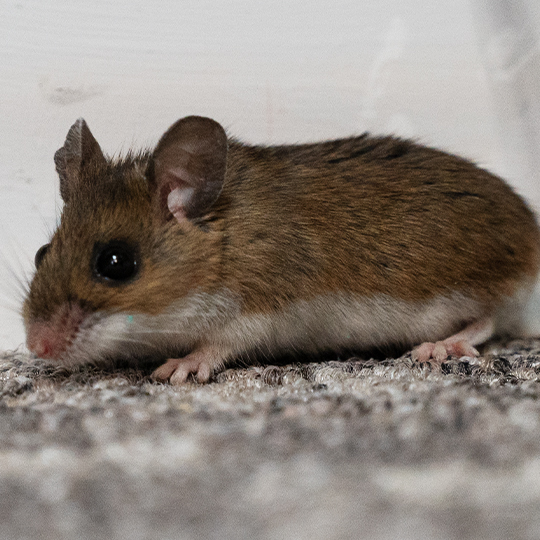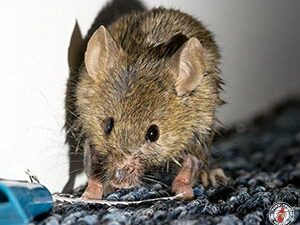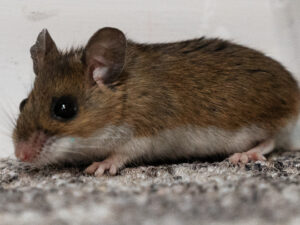
Picture this. You’re sitting in your living room, enjoying a quiet evening, when suddenly—you hear it. That unmistakable scuttling noise coming from the walls or ceiling. Your heart sinks. Could it be a mouse infestation? For homeowners, the mere thought of unwelcome furry guests can be distressing. Mice not only cause damage to your property but can also pose health risks to you and your family.
But how do you know for sure if you have a mouse problem on your hands? And when is it time to call in professional pest control? In this post, we’ll explore the telltale signs of a mice infestation and provide guidance on when to seek expert help. Along the way, we’ll offer practical tips and insights to help you maintain a rodent-free home.
The Telltale Signs of Mice Presence
Droppings and Urine Trails
One of the most obvious signs of a mouse infestation is the presence of droppings. Mouse droppings are small, dark, and shaped like rice grains. You may find them scattered along baseboards, inside cabinets, or near food sources. Additionally, mice leave behind urine trails that glow under UV light. If you suspect an infestation, a black light can help confirm your suspicions.
It’s important to clean up droppings promptly, as they can carry harmful bacteria. Always wear gloves and a mask while doing so. Disinfect the area thoroughly to prevent contamination. Regular inspection and cleaning can help you monitor the situation and assess the severity of the infestation.
Gnaw Marks and Damage
Mice have a constant need to gnaw due to their ever-growing teeth. This can lead to noticeable damage around your home. Look for gnaw marks on furniture, wires, and even walls. You might also find shredded paper or fabric, which mice use to build their nests.
Damaged wires pose a fire hazard, so it’s essential to address any signs of gnawing immediately. Consider using wire covers or protective tubing to prevent future damage. Regularly inspect your home for new signs of gnawing, especially in hidden or hard-to-reach areas.
Unusual Noises and Odors
Mice are nocturnal creatures, so you’re more likely to hear them at night. Listen for scratching, squeaking, or scurrying sounds coming from your walls or attic. These noises can be a strong indicator of a mice infestation.
A distinctive musky odor often accompanies a mouse infestation. This smell results from their urine and nesting materials. If you notice an unusual odor, try to locate the source and investigate further. Identifying the problem early can prevent a minor issue from becoming a full-blown infestation.
Recognizing Nesting Sites
Hidden Hideouts
Mice are experts at finding cozy spots to build their nests. Common hiding places include wall cavities, attics, and basements. They often use shredded materials like paper, fabric, or insulation to create their nests. Look for small piles of debris in corners or hidden spaces.
To locate nests, pay attention to areas with visible droppings or gnaw marks. Mice prefer secluded, undisturbed areas, so be thorough in your search. Identifying nesting sites can help you assess the extent of the infestation and take targeted action.
Pathways and Runways
Mice establish regular pathways or runways to travel between their nests and food sources. These routes often appear as greasy or dirt-streaked trails along walls or baseboards. You may also notice tiny footprints or tail marks in dusty areas.
Once you identify these pathways, you can set traps or bait stations along them. This increases your chances of capturing the mice and reducing their population. Regular monitoring of these areas can help you gauge the effectiveness of your control measures.
The Importance of Early Detection
Early detection is crucial in managing a mouse infestation. By identifying signs early, you can take prompt action to prevent the problem from worsening. Regular home inspections and maintenance can help you spot potential issues before they escalate.
If you suspect an infestation, act quickly to minimize damage and health risks. The longer you wait, the more difficult and costly it can become to resolve the problem. Early detection and intervention are key to maintaining a rodent-free home.
When to Call in the Professionals
Overwhelming Evidence
If you’ve identified multiple signs of a mouse infestation, it may be time to call in a professional. Pest control experts have the tools and knowledge to assess the situation accurately. They can determine the severity of the infestation and recommend appropriate solutions.
Professional exterminators can also address infestations that are difficult to access or require specialized treatment. Their expertise ensures that the problem is resolved efficiently and effectively. Don’t hesitate to seek help if you’re feeling overwhelmed or unsure of how to proceed.
Health Risks and Safety Concerns
Mice can carry diseases and parasites, posing health risks to you and your family. Hantavirus, salmonellosis, and leptospirosis are just a few examples of illnesses associated with mice. If you’ve noticed signs of illness or allergy-like symptoms, it’s essential to address the infestation promptly.
Professional pest control services can help minimize health risks by implementing safe and effective treatment methods. They can also provide guidance on how to prevent future infestations. Prioritizing your family’s health and safety is always worth the investment.
Persistent Infestations
If DIY methods haven’t resolved the problem, it’s time to call in the experts. Some infestations can be particularly challenging to manage without professional help. Factors like the size of your home, the extent of the infestation, and the mice’s access to food and shelter can make control efforts difficult.
Professional exterminators have access to advanced tools and techniques that may not be available to homeowners. They can identify and address the root cause of the problem, ensuring a long-term solution. Don’t hesitate to seek help if you’re struggling to manage the infestation on your own.
Practical Tips for Preventing Mouse Infestations
Sealing Entry Points
Preventing mice from entering your home is the first line of defense. Inspect your home’s exterior for gaps, cracks, and holes. Seal any openings with steel wool or caulk, as mice can squeeze through surprisingly small spaces.
Pay special attention to areas where utility lines enter your home, as these are common entry points for mice. Regularly inspect and maintain your home’s exterior to keep it secure. By eliminating entry points, you can significantly reduce the likelihood of an infestation.
Proper Food Storage
Mice are attracted to food sources, so it’s crucial to store food properly. Use airtight containers for pantry items and pet food. Clean up spills and crumbs promptly, and avoid leaving pet food out overnight.
Regularly clean your kitchen and dining areas to minimize potential food sources. Be mindful of storing food in garages or basements, as these areas are more accessible to mice. Proper food storage is a simple yet effective way to deter mice from settling in your home.
Maintaining a Clean Environment
A clean home is less inviting to mice. Regularly vacuum and dust to eliminate food particles and potential nesting materials. Keep clutter to a minimum, as it provides hiding spots for mice.
Pay attention to areas like basements, attics, and garages, where clutter tends to accumulate. Regular cleaning and organization can help you identify potential issues early. Maintaining a clean environment is essential for preventing and managing mouse infestations.
The Role of Pets in Mice Control
Natural Deterrents
Pets like cats and dogs can be natural deterrents to mice. Their presence alone can discourage mice from entering your home. Cats, in particular, are known for their hunting instincts and can help keep the mouse population in check.
While pets can be helpful, they should not be relied upon as the sole method of control. Always combine their efforts with other preventive measures. Keep in mind that pets may not be effective in dealing with larger infestations.
Monitoring and Alerting
Pets can also help alert you to the presence of mice. Cats and dogs may show interest in areas where mice are active, such as walls or cabinets. Pay attention to your pet’s behavior, as it can provide valuable clues about potential infestations.
If your pet is exhibiting unusual behavior, investigate the area for signs of mice. Early detection can help you address the problem before it worsens. Your pet’s instincts can be a valuable asset in maintaining a rodent-free home.
Health and Safety Considerations
While pets can help control mice, they can also be at risk for diseases carried by rodents. Keep your pets’ vaccinations up to date and consult your veterinarian if you have concerns. Avoid using toxic baits or traps in areas where your pets have access.
Ensure that your pest control methods are safe for both your family and your pets. Consider using pet-safe alternatives like snap traps or electronic traps. Protecting your pets’ health and safety should always be a priority when dealing with an infestation.
The Importance of Regular Home Inspections
Early Detection
Regular home inspections can help you identify signs of a mouse infestation before it becomes a significant problem. Check for droppings, gnaw marks, and nesting materials during routine inspections. Early detection allows you to take prompt action and prevent the infestation from worsening.
Conduct inspections both inside and outside your home, paying attention to potential entry points. Regular inspections can also help you monitor the effectiveness of your preventive measures. Early detection and intervention are key to maintaining a rodent-free home.
Preventive Maintenance
In addition to inspections, perform regular maintenance to keep your home in good condition. Repair damaged siding, seal gaps, and replace worn weather stripping. Proper maintenance can help deter mice and other pests from entering your home.
Stay proactive in addressing potential issues before they escalate. Regular maintenance can also improve your home’s overall safety and energy efficiency. A well-maintained home is less likely to attract unwanted pests.
Professional Inspections
Consider scheduling professional inspections for added peace of mind. Pest control experts can identify signs of infestation that you may have missed. They can also provide recommendations for preventive measures and treatment options.
Professional inspections are especially beneficial for homes with a history of infestations. Regular professional assessments can help you maintain a healthy and pest-free living environment. Investing in professional inspections is a worthwhile measure for long-term pest control.
Choosing the Right Pest Control Service
Research and Recommendations
When selecting a pest control service, start by researching local companies and reading reviews. Ask friends, family, or neighbors for recommendations. A reputable company should have positive reviews and a track record of successful treatments.
Look for companies that are licensed and insured, as this ensures they meet industry standards. A little research can go a long way in finding a reliable and trustworthy service. Choosing the right company is crucial for effective and safe pest control.
Evaluating Treatment Methods
Inquire about the treatment methods used by the pest control service. Opt for companies that prioritize safe and environmentally friendly practices. Ask about the specific products and techniques they use to ensure they align with your preferences.
Discuss any concerns you may have about the safety of pets or family members. A reputable company should be transparent about their methods and address any questions you have. Understanding the treatment process can help you make an informed decision.
Cost and Guarantees
Compare quotes from multiple pest control services to ensure you receive a fair price. Be wary of companies that offer unusually low prices, as this may indicate subpar service. Inquire about guarantees or warranties offered by the company.
A reputable pest control service should stand by their work and offer follow-up visits if needed. Investing in quality pest control can save you time and money in the long run. Choose a company that provides value and peace of mind.
Understanding the Risks of DIY Pest Control
Limited Effectiveness
While DIY methods can be effective for minor infestations, they may not be sufficient for larger problems. Store-bought traps and baits may not address the root cause of the infestation. In some cases, DIY methods can even exacerbate the problem by scattering mice to new areas.
Assess the severity of the infestation before deciding on a course of action. If DIY methods haven’t resolved the issue, it’s time to seek professional help. Recognizing the limitations of DIY pest control can prevent wasted time and resources.
Health and Safety Concerns
DIY pest control methods can pose health and safety risks if not used properly. Toxic baits and pesticides can harm pets and family members if ingested or mishandled. Always follow label instructions and take precautions to minimize exposure.
Consider using non-toxic alternatives for safer pest control. Be mindful of where you place traps and baits to prevent accidental contact. Prioritizing safety is essential when dealing with any pest control method.
Environmental Impact
Improper use of pesticides can have negative effects on the environment. Runoff and contamination can harm local ecosystems and wildlife. Choose environmentally friendly pest control methods to minimize your impact.
Consider using natural repellents or non-toxic traps as alternatives to chemical pesticides. Responsible pest control practices help protect the environment and promote sustainability. Being mindful of your impact can contribute to a healthier planet.











